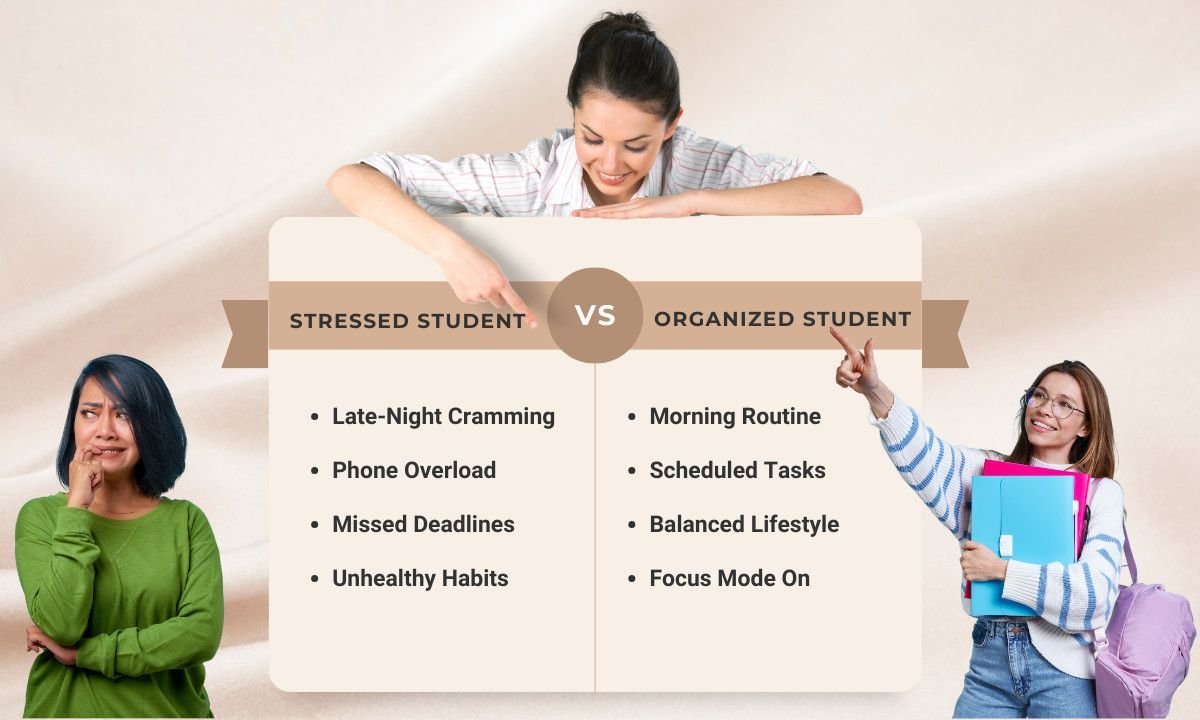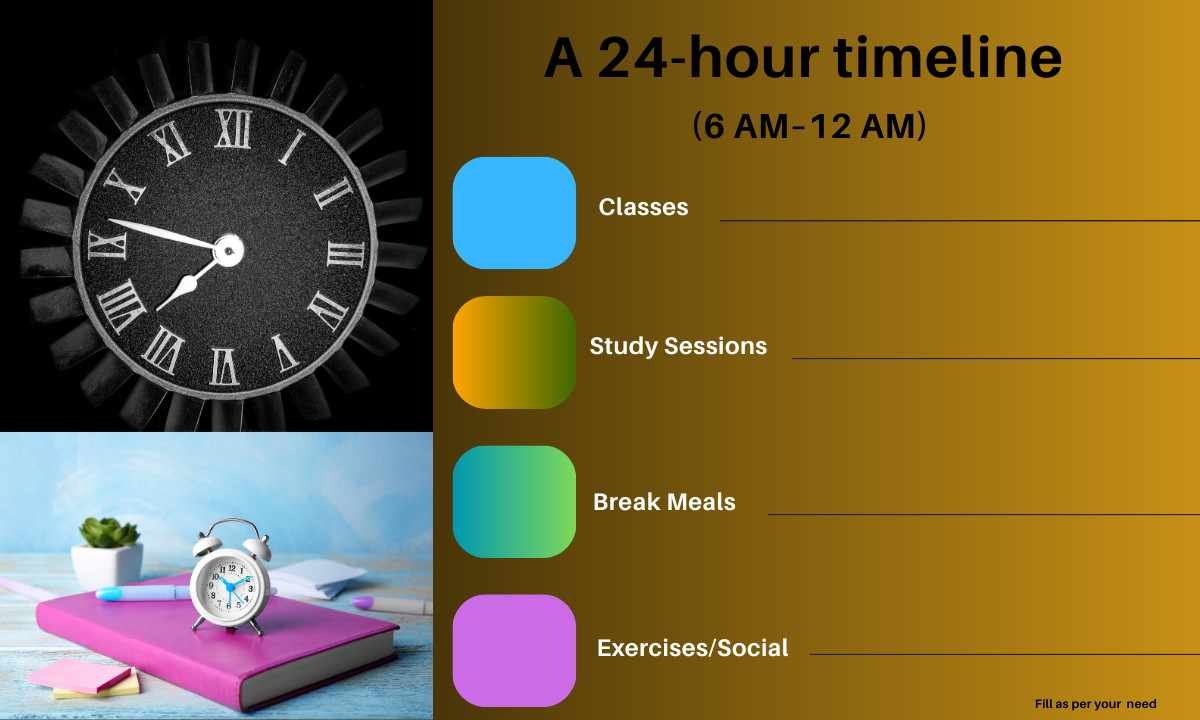Introduction
Time management is one of the most crucial skills a student can develop. With academic pressures, extracurricular activities, and personal commitments, managing time efficiently can make the difference between success and burnout.
Effective time management for students helps them stay organized, reduce stress, and achieve their goals without feeling overwhelmed. Whether it’s preparing for exams, completing assignments, or maintaining a social life, mastering this skill ensures a balanced and productive student life.
In this article, we’ll explore 10 compelling reasons why time management is essential for students and how they can implement it for better academic and personal success.
1. Improves Academic Performance
One of the most significant benefits of time management for students is its direct impact on academic performance. Students who plan their study schedules effectively tend to retain information better and perform well in exams.
Structured study sessions prevent last-minute cramming.
Breaking subjects into manageable chunks helps in better understanding.
Example: A student who revises daily performs better than one who studies only before exams.
Tip: Use a weekly planner to allocate time for each subject based on difficulty level.
2. Reduces Stress and Anxiety

Poor time management for students often leads to procrastination, missed deadlines, and unnecessary stress. When students rush to complete assignments or study at the last minute, their anxiety levels rise, affecting their mental health.
Planning ahead reduces panic before exams.
A well-organized schedule ensures tasks are completed on time.
Example: Students who follow a timetable experience less exam stress.
Tip: Try apps like Todoist or Google Calendar to keep track of deadlines.
3. Enhances Productivity and Efficiency

Time management helps students work smarter, not harder. By prioritizing tasks, they can focus on what’s important and avoid wasting time on distractions.
Techniques like the Pomodoro Technique (25-minute focused sessions) improve concentration.
The Eisenhower Matrix helps differentiate between urgent and important tasks.
Example: A student who blocks social media during study hours gets more done.
Tip: Set daily goals and reward yourself after completing them.
4. Helps Maintain a Healthy Work-Life Balance
Students often struggle to balance academics, hobbies, and social life. Proper time management ensures they have enough time for relaxation and personal growth.
Scheduling study breaks prevents burnout.
Allocating time for sports, music, or friends keeps life enjoyable.
Example: A student who plans study and leisure time stays motivated.
Tip: Follow the 50/10 rule—study for 50 minutes, take a 10-minute break.
5. Builds Self-Discipline and Responsibility

Time management for students instills self-discipline, a skill that benefits students beyond academics. Those who stick to schedules develop a strong sense of responsibility.
Meeting deadlines becomes a habit.
Helps resist distractions like excessive gaming or social media.
Example: A disciplined student is more likely to succeed in college and career.
Tip: Start with small, achievable goals to build discipline gradually.
6. Prepares for Future Career Success
Employers highly value time management skills. Students who master this early will find it easier to handle workplace demands.
Meeting project deadlines in school mirrors professional expectations.
Multitasking efficiently is a key career skill.
Example: Interns who manage time well are more likely to get job offers.
Tip: Treat college assignments like professional projects to build work ethic.
7. Encourages Better Decision-Making
When students manage their time well, they learn to prioritize tasks effectively. This helps in making smarter choices about studies, hobbies, and social life.
The 80/20 Rule (Pareto Principle) suggests focusing on tasks that yield the most results.
Avoids time-wasting activities like binge-watching before exams.
Example: A student who prioritizes revision over unnecessary outings scores higher.
Tip: Make a priority list every night for the next day.
8. Boosts Confidence and Motivation
Completing tasks on time gives students a sense of accomplishment, boosting their confidence and motivation.
Small wins (like finishing an assignment early) build momentum.
Reduces feelings of guilt from procrastination.
Example: A student who sticks to a study plan feels more in control.
Tip: Track progress in a journal to stay motivated.
9. Allows Time for Skill Development
Good time management for students creates extra hours for learning new skills—coding, languages, sports, or creative arts.
Students can pursue internships or online courses.
Extracurricular activities improve resumes.
Example: A student who balances studies and skill-building stands out in job applications.
Tip: Dedicate at least 1-2 hours per week to a new skill.
10. Ensures Better Sleep and Mental Health
Poor time management for students leads to all-nighters, sleep deprivation, and exhaustion. A well-planned schedule ensures proper rest.
Fixing a sleep schedule improves memory and focus.
Avoids late-night cramming before exams.
Example: Students who sleep well perform better in tests.
Tip: Follow a “no screens before bed” rule for better sleep quality.
Conclusion
Time management is not just about studying harder—it’s about studying smarter. From improving grades to reducing stress, the benefits are undeniable.
By implementing simple strategies like using planners, setting priorities, and avoiding procrastination, students can transform their academic and personal lives.
Start today! Pick one time-management technique and apply it this week. The results will speak for themselves.
FAQs
Time management helps students stay organized, reduce stress, improve grades, and maintain a healthy work-life balance. It ensures they complete tasks efficiently without last-minute cramming or burnout.
By planning study sessions, avoiding procrastination, and revising regularly, students retain information better and perform well in exams. Structured learning leads to higher grades.
Popular techniques include:
✔ Pomodoro Technique (25-minute focused sessions + 5-minute breaks)
✔ Eisenhower Matrix (prioritizing urgent vs. important tasks)
✔ Time blocking (assigning fixed hours for each subject)
When students plan ahead and avoid last-minute work, they feel more in control. This reduces anxiety, improves sleep, and prevents burnout.
Yes! Proper scheduling ensures students have time for studies, hobbies, social life, and rest, preventing exhaustion and maintaining mental well-being.
Useful tools include:
📅 Planners/Calendars (Google Calendar, Notion)
⏱ Focus Apps (Forest, Focus To-Do)
📝 Task Managers (Todoist, Trello)
Employers value punctuality, meeting deadlines, and efficient task handling. Students who master time management early adapt better to workplace demands.
Procrastination—delaying tasks until the last minute leads to rushed work, stress, and poor results. Breaking tasks into smaller steps helps avoid this.
It varies, but a good rule is 2-3 hours daily for high school students and 3-5 hours for college students, with breaks in between.
Yes! All-nighters, missed deadlines, and constant stress can lead to anxiety, sleep disorders, and low motivation. Proper planning prevents these issues.



